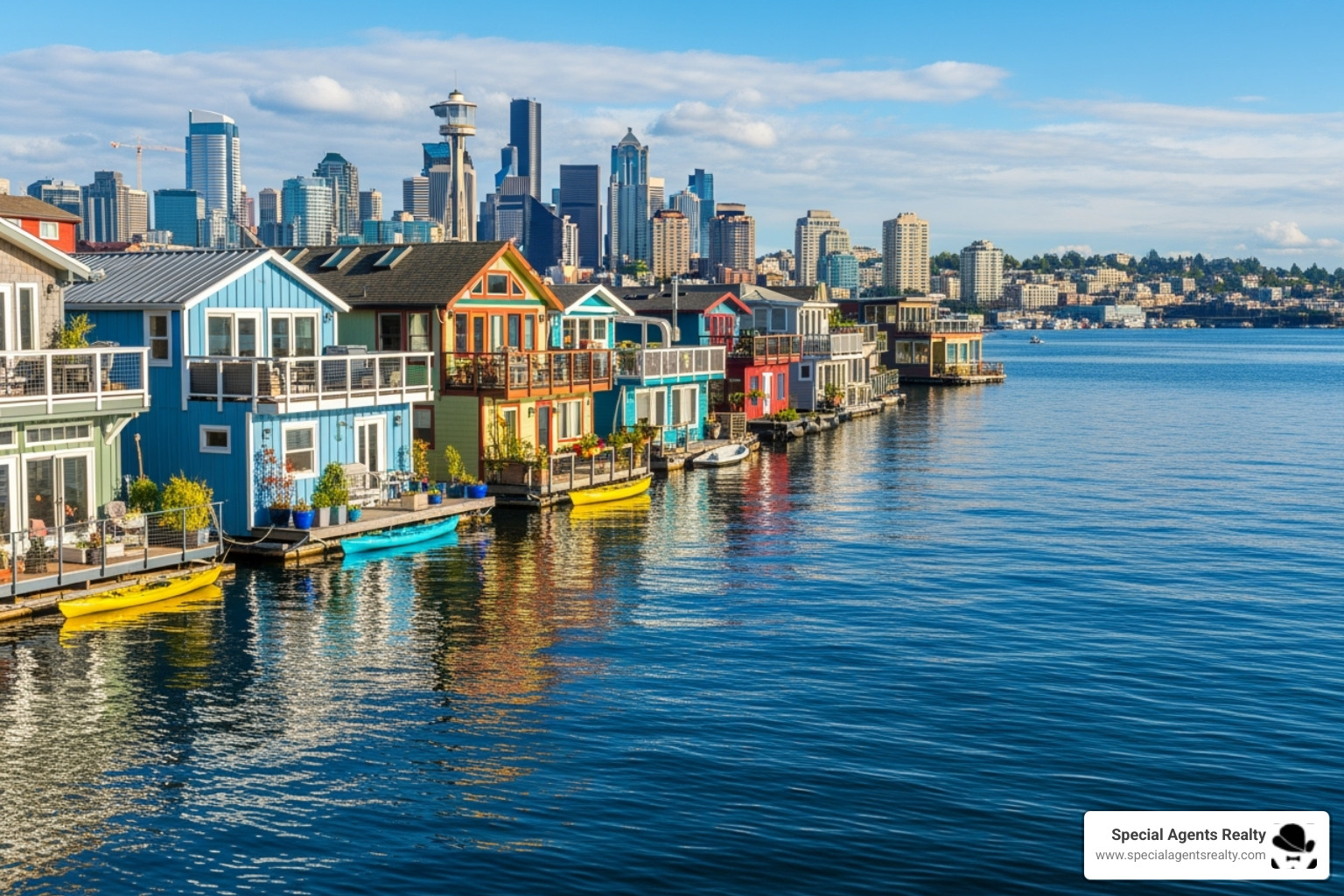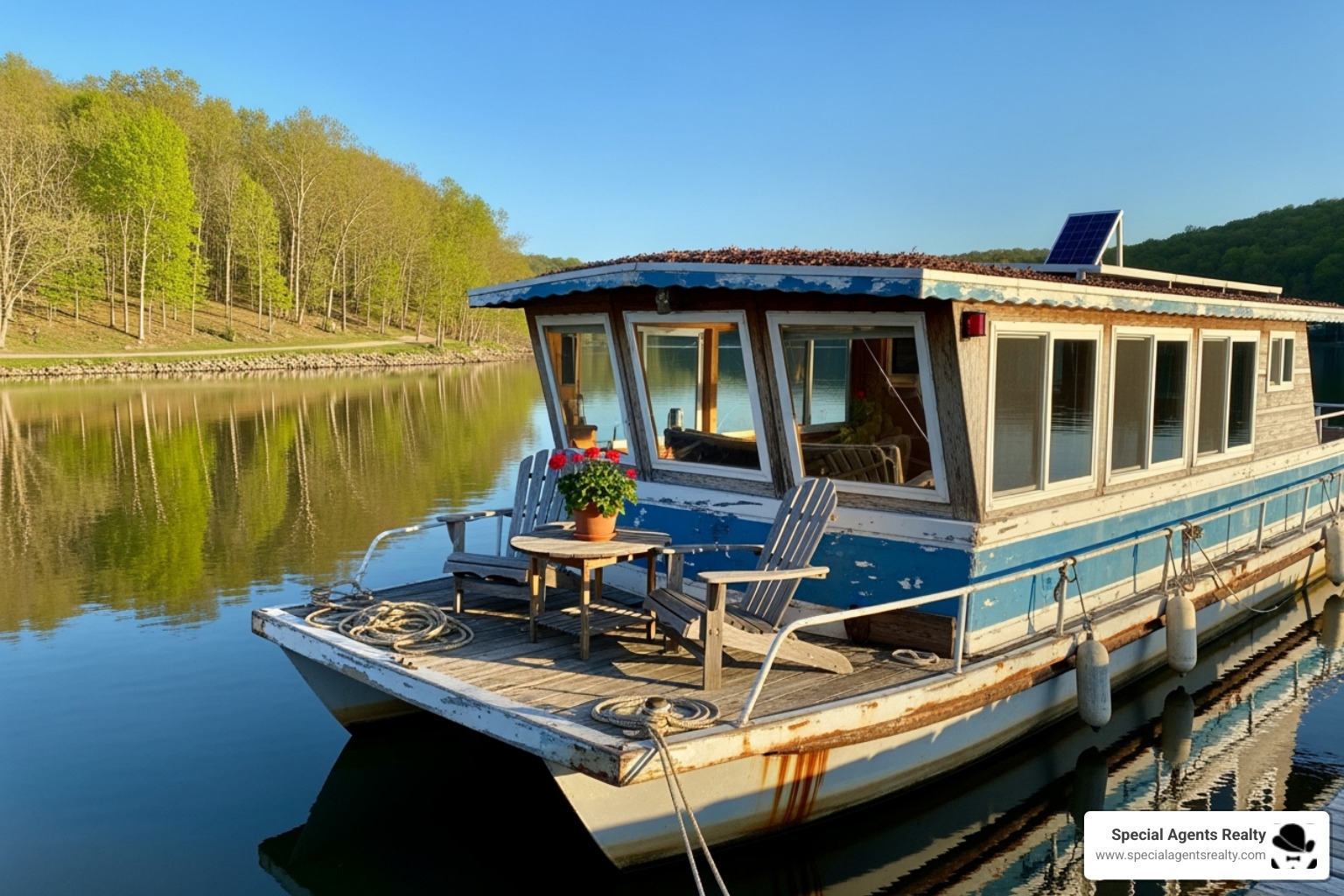
Why Buying a Used Houseboat Makes Sense
When you buy a used houseboat, you're choosing a path that combines adventure with affordability. With 407 used houseboats currently on the market, finding your floating home has never been more accessible.
Quick Answer: Where to Start
- Browse Online Marketplaces - Sites like Boat Trader and YachtWorld list hundreds of used houseboats.
- Set Your Budget - Used houseboats range from $6,290 to $1,434,900, with most averaging around $50,000.
- Hire a Marine Surveyor - This is essential for inspecting the hull, engines, and onboard systems.
- Secure Financing - Marine lenders offer specialized loans with terms similar to RV financing.
- Complete Legal Requirements - Verify the title, register with your state, and arrange insurance.
The used houseboat market offers everything from cozy 28-foot models to sprawling 128-foot floating palaces. Most average 50 feet and accommodate 10 passengers. Why buy used? A new houseboat depreciates instantly, while a used vessel has already taken that financial hit. You get proven performance, maintenance records, and unique character.
The process is straightforward: search listings, inspect with professional help, arrange financing, and complete the paperwork. The key difference is your property floats. Living on a houseboat averages $955 per month—often less than traditional housing. You'll pay moorage fees instead of property taxes in many states, and utilities are typically lower.
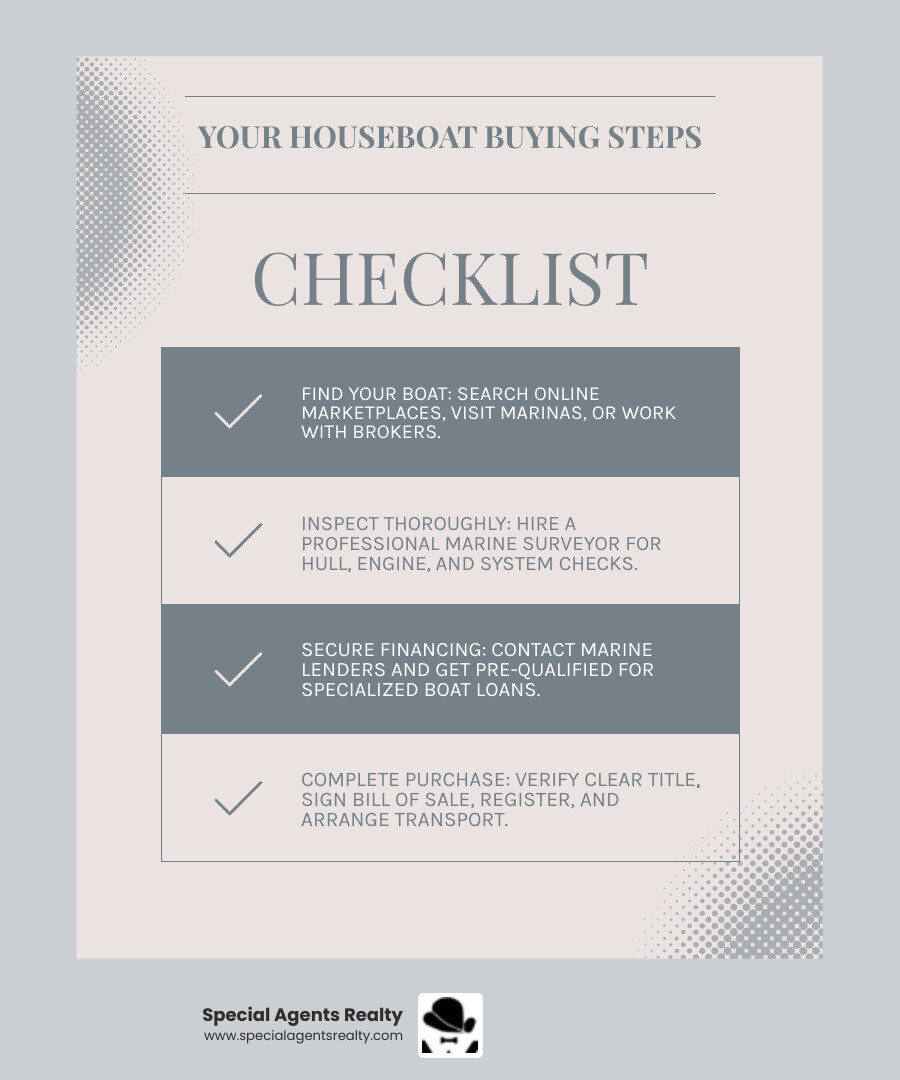
Why a Used Houseboat is a Smart Choice
Living on the water is a dream, but new houseboats are expensive. That's why used houseboats are often the smarter choice. When you buy a used houseboat, you're not settling; you're making a savvy investment that gets you on the water faster and with more money to spare.
| Factor | New Houseboat | Used Houseboat |
|---|---|---|
| Purchase Price | Significantly higher | Substantially lower |
| Depreciation | Rapid initial depreciation | Slower, more stable depreciation; initial hit absorbed |
| Customization | Built to your specifications (long wait) | Often comes with upgrades/personal touches from prior owners |
| Known History | None | Maintenance records, survey reports, past usage data |
| Warranty | Manufacturer's warranty (limited duration) | Typically sold "as-is" (unless through a dealer) |
The Financial Advantages
The most obvious perk is saving a fortune. New houseboats can cost millions, but quality used options are often around $50,000. Depreciation is your friend when buying used. The original owner absorbed the initial, rapid loss in value, making your vessel a more stable investment. A lower initial investment means less financial stress and more budget for repairs, upgrades, or simply enjoying your new lifestyle.
Used houseboats often come with upgrades paid for by the previous owner, like modern interiors, new engines, or custom woodwork. Established maintenance records offer transparency, helping you understand the boat's history and budget for future needs.
Potential Downsides to Consider
Of course, used houseboats have challenges. Wear and tear is inevitable. Engines have hours on them, and systems age. You may face repairs sooner than with a new boat. Outdated systems, from electrical to navigation, may need upgrading, which can be costly.
The biggest concern is hidden issues. Most are sold "as-is," so problems found after the sale are yours to fix. This could include hull cracks or engine failure. Financing can also be trickier for older vessels, potentially leading to higher interest rates or larger down payments.
However, these downsides aren't dealbreakers. A thorough marine survey can uncover most problems. With proper planning and professional help, a used houseboat is a smart choice for starting your floating home adventure.
Where to Find Your Floating Dream Home
The hunt for your perfect used houseboat is exciting, and knowing where to look is key.
Online marketplaces like Boat Trader, YachtWorld, and BoatCrazy list hundreds of used houseboats, with prices from $6,290 to over $1.4 million. You can filter by location, price, length, and manufacturer. Specialized boat brokers, especially in houseboat-rich areas like Puget Sound, offer personal expertise and insider knowledge. They can guide you through the entire process.
Walk the docks at local marinas. You might find a "For Sale" sign on a hidden gem that isn't listed online. Private seller listings on Craigslist or Facebook Marketplace offer direct access to owners. In the Pacific Northwest, searching seattle boats for sale by owner "houseboat" - craigslist can uncover local treasures.
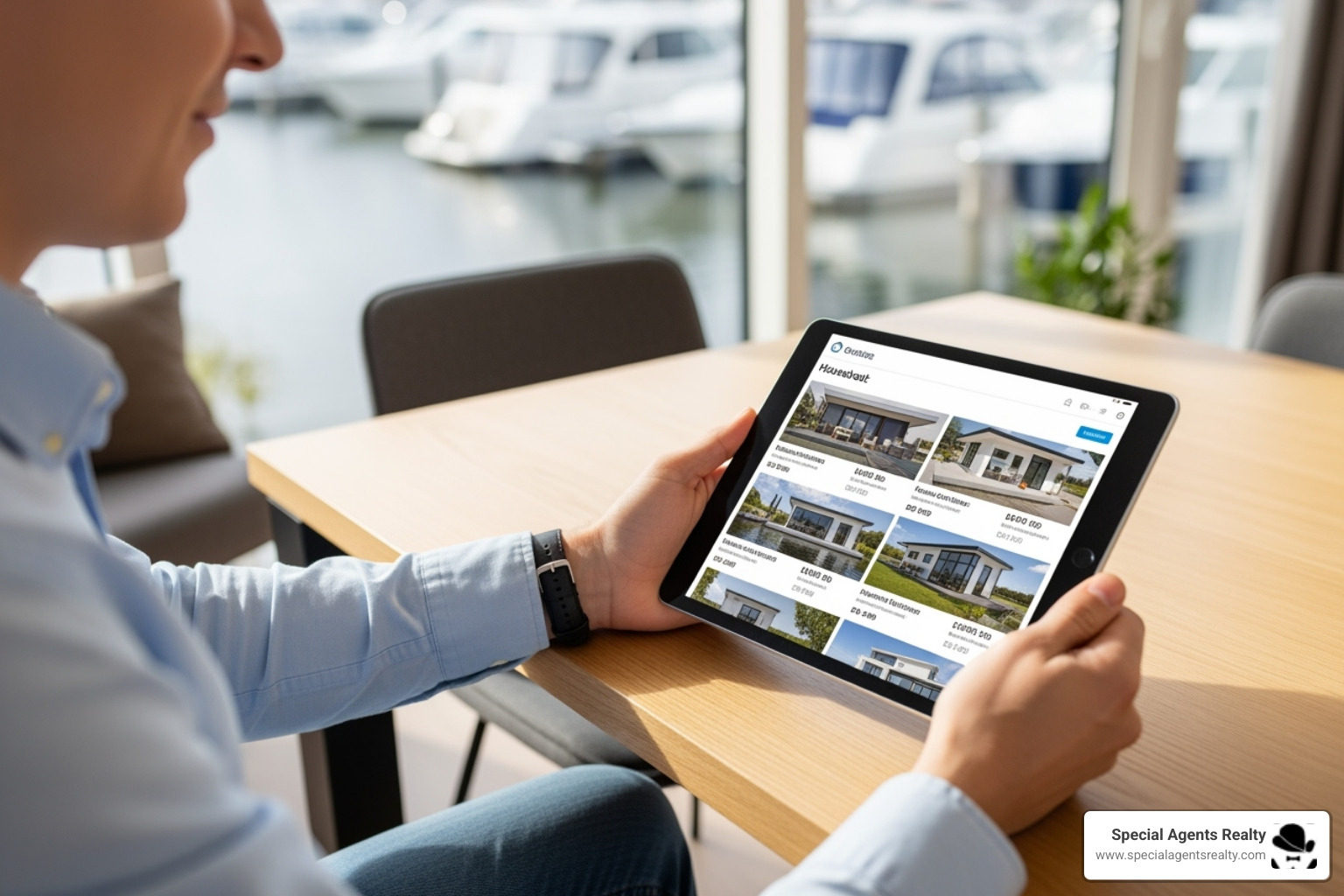
Buying from a Private Seller vs. a Dealer
When you buy a used houseboat, choosing between a private seller and a dealer presents different trade-offs. Private sellers may offer better prices and more negotiation room, but sales are typically "as-is," and you'll handle all the paperwork yourself. Dealers and brokers provide structure and protection. They handle paperwork, ensure the boat is seaworthy, and may offer limited warranties. While you might pay more, the peace of mind is often worth it.
Key Factors to Consider When Choosing
Match the houseboat to your needs by considering these key factors:
- Size and layout are crucial. Houseboats range from 28 to 128 feet. Consider if it's for weekend trips or full-time living and whether the space suits your family's needs.
- Hull type impacts handling. Pontoon hulls are stable in calm water, while displacement hulls offer a smoother ride in choppy conditions. Catamaran designs offer a mix of stability and speed.
- Age and manufacturer matter. Older boats have character but require more maintenance. Reputable builders like Sumerset, Stardust Cruisers, Gibson, Sharpe, and Holiday Mansion often mean better construction.
- Your intended use is paramount. A recreational vessel has different needs than a full-time liveaboard, which requires reliable systems and ample storage. Ensure the boat's condition aligns with your plans.
The Ultimate Guide to Inspecting a Used Houseboat
A thorough inspection is the most critical step when you buy a used houseboat. Don't treat it as optional; it's your best defense against costly surprises. We strongly recommend hiring a professional marine surveyor. Their expertise and specialized tools can spot problems an untrained eye would miss. They are an unbiased expert with no stake in the sale.
A comprehensive survey covers the hull, engines, generators, electrical and plumbing systems, safety equipment, and overall condition. The final report is your roadmap, detailing the boat's health and any needed repairs. Pro tip: Accompany the surveyor during the inspection. It's a great learning opportunity and allows you to ask questions in real-time.
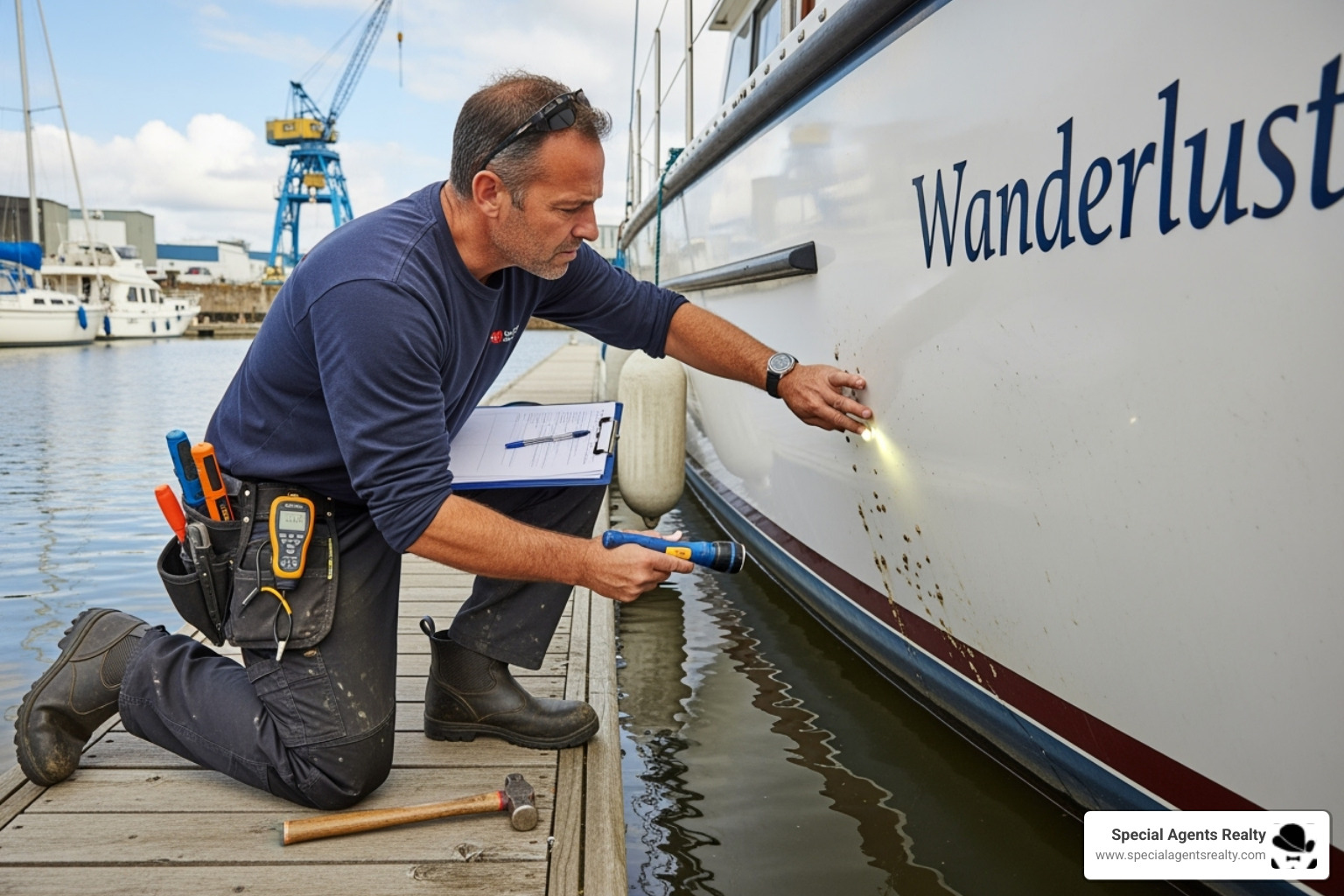
Essential Onboard System Checks
When you buy a used houseboat, you're buying several interconnected systems. Here are the critical areas that deserve attention:
- Hull and Structure: The surveyor will check the hull for cracks, blisters, or rot. The hull-deck joint and pontoon integrity are critical areas for inspection.
- Engine and Generator: Check engine hours and review maintenance logs. A professional will look for corrosion and leaks and perform a compression test. Horsepower varies widely, from 25 hp to over 1,300 hp.
- Electrical and Plumbing: Ensure the electrical system meets current standards. Check battery age and condition. For plumbing, look for leaks, corrosion, or blockages, as water damage can be extensive.
- Roof, Decks, and Windows: Check for soft spots on the roof and decks, which indicate water intrusion. Windows and hatches must seal properly to prevent leaks and rot.
Common Problems to Look for When You buy a used houseboat
Knowing common problems helps you spot red flags during viewings:
- Osmosis: These are blisters on fiberglass hulls below the waterline, indicating water has penetrated the gelcoat. Repairs can be expensive.
- Stringer and Transom Rot: Rot in these structural wood components can compromise the boat's integrity. Soft spots on decks are a warning sign.
- Outdated Wiring: Systems that don't meet modern safety standards are a serious fire hazard. Look for frayed wires or a messy electrical panel.
- Leaky Windows and Hatches: Minor leaks can lead to major interior damage, mold, and rot. Look for water stains or warping.
- High Engine Hours: High hours, especially without good maintenance records, may mean an engine is near the end of its useful life. Engine replacement is a major expense.
Navigating the Costs and Paperwork to buy a used houseboat
After finding and inspecting your boat, the next step is navigating the costs and paperwork. The purchase price, ranging from $6,290 to over $1.4 million, is just the start. Understanding the full cost of ownership is key to budgeting realistically when you buy a used houseboat.
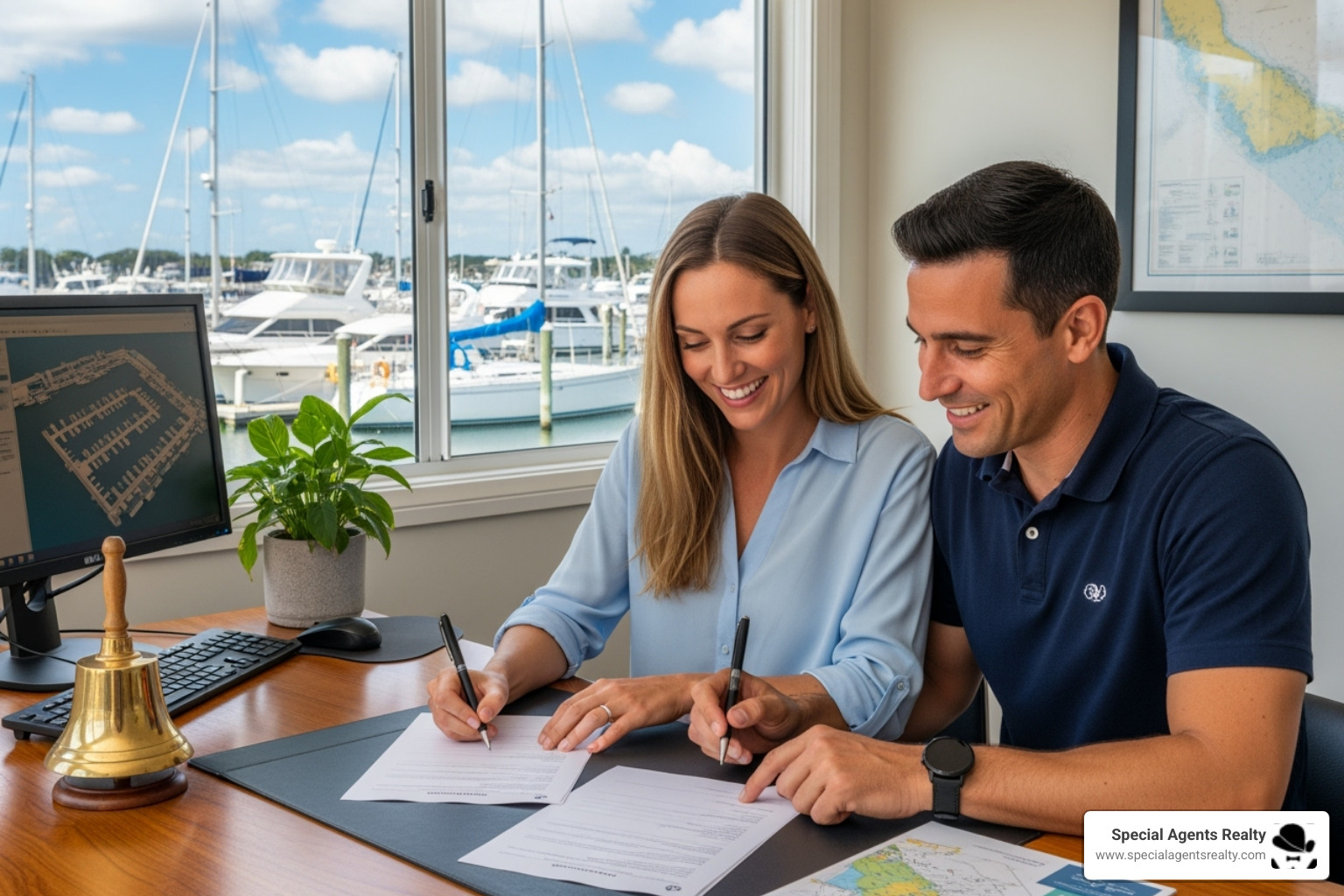
Ongoing costs include moorage fees, which vary by marina and location, and marine insurance, which is required by most marinas and lenders. You'll also have annual registration fees. Unlike homes, houseboats often don't incur property taxes, which can be a significant saving. Finally, budget for routine maintenance and repairs.
How to Finance Your Used Houseboat Purchase
Most buyers will need financing. Traditional mortgages don't apply, as houseboats are personal property. Instead, you'll seek a loan from a specialized marine lender. Marine loans function like RV financing, and you can often Instantly Pre-Qualify for a boat loan to see your options.
Down payments are typically 10-20%, and loan terms can extend up to 20 years, making monthly payments manageable. Real estate professionals specializing in floating homes, like our team at Special Agents Realty, have relationships with lenders who understand this unique market and can guide you to the right resources.
Legal Essentials: Title, Registration, and Bill of Sale
The legal transfer of ownership involves several key steps:
- Verify a Clear Title: A title search confirms the seller is the legal owner and there are no outstanding liens. Never skip this step.
- Get a Proper Bill of Sale: This legal document transfers ownership. It must include a full description of the boat, the price, date, and signatures from both parties.
- Complete Registration: Most recreational houseboats are registered with the state. Larger vessels may require U.S. Coast Guard documentation, which offers legal advantages for extensive travel.
- Understand Sales Tax: Finally, understand your sales tax obligations, which vary by state. Proper paperwork ensures your new floating home is legally yours.
After the Handshake: Transporting Your New Home
Once you've closed the deal on your used houseboat, you need to get it to its new slip. How you do this depends on the boat's location and design.
If the new marina is nearby, transporting by water is the simplest option. This can be done under the boat's own power or with a tow. Ensure the boat is seaworthy, with adequate fuel and safety gear. Piloting a large vessel requires experience. If you're not confident, hiring a licensed captain for the delivery is a wise and safe investment.
For long distances or land-locked boats, you'll need a professional boat hauler. They use specialized trucks and trailers and understand how to move oversized vessels safely. Overland transport involves permits and regulations for oversized loads, which vary by state. Professional haulers handle this complex paperwork as part of their service.
You must prepare the boat for transport. This includes securing loose items, draining water tanks, disconnecting batteries, and sometimes removing tall structures like flybridges to meet height clearances. Your hauler will provide a checklist.
Finally, coordinate with your new marina. Inform them of your arrival time so your slip is ready. They can assist with docking or arranging a crane if arriving by truck. This process may seem complex, but with good planning and professional help, your used houseboat will be settled in its new home, ready for the adventure to begin.
Frequently Asked Questions about Buying a Used Houseboat
Are houseboats cheaper to live in than regular houses?
Often, yes, but it depends on your location and lifestyle. The average cost to live on a houseboat is around $955 per month, which is often lower than traditional housing, especially in high-cost areas like Seattle. A key difference is paying moorage fees instead of property taxes, which can be a major saving. Utility costs are also typically lower due to the smaller living space. However, you must budget for ongoing maintenance, as marine environments are harsh and specialized repairs can be more frequent than with a land-based home. For many, a used houseboat offers a genuinely affordable lifestyle.
Can you get a mortgage on a used houseboat?
Not a traditional one, but financing is available. Traditional home mortgages don't apply because houseboats are classified as vessels, not real estate. Instead, you'll get a specialized marine loan from a lender who understands the boat market. These loans work like RV financing, with down payments around 10-20% and terms up to 20 years. Interest rates depend on the boat's age, value, and your credit history. Working with a knowledgeable broker who specializes in floating homes, like our team at Special Agents Realty, is invaluable. We have relationships with specialized lenders and can guide you through the process. The provided link to Instantly Pre-Qualify for a boat loan can be a helpful starting point.
What's the process for moving a houseboat after purchase?
Moving your used houseboat depends on its location and destination. Water-based delivery is simplest for short distances, either under its own power or by tow. If you're not an experienced pilot, hiring a professional captain is a smart, safe choice. Overland transport is necessary for long-distance moves and requires a professional boat hauling company. This involves significant costs and logistics, including oversized-load permits, which the hauler typically handles. You'll need to prepare the boat by securing loose items and draining tanks. Finally, coordinate with your new marina to ensure your slip is ready. While it seems complex, proper planning and professional help make the move manageable.
Your New Life on the Water Awaits
We've covered the journey of buying a used houseboat, from finding and inspecting to financing and paperwork. Now, the real adventure begins. Buying a houseboat is a lifestyle choice. Imagine waking up to water views and the sound of gentle waves instead of traffic. This can be your everyday reality.
A houseboat offers freedom and flexibility, whether for weekend getaways or full-time living. It's a unique lifestyle with a passionate, tight-knit community. Choosing a used vessel makes this dream achievable. The investment is lower, and with average living costs around $955 per month, it's more accessible than many realize.
The process involves work—inspections, paperwork, and maintenance are all part of ownership. But you don't have to steer it alone. In the Pacific Northwest, local experts can make all the difference. The team at Special Agents Realty specializes in floating homes throughout Seattle, Bremerton, Kirkland, Marysville, Bothell, and the Puget Sound region. We know the marinas, regulations, and market. When you're ready, explore our current houseboats and floating homes listings. We'll guide you every step of the way.
Your new life on the water awaits. We've shown you how to buy a used houseboat. The only question left is: are you ready to cast off the lines?

.avif)

